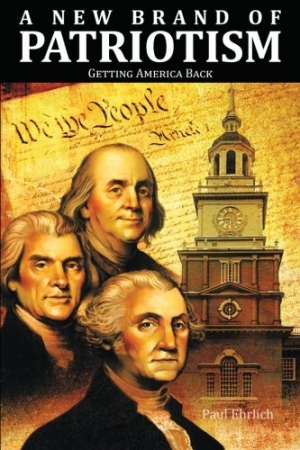A New Brand of Patriotism
Getting America Back
A Capraesque naïveté fills this charming attempt to show America what it could be.
“The great America that we grew up to love doesn’t exist anymore,” an old veteran laments during a meeting with a group of fellow war heroes in A New Brand of Patriotism. Their unique, fanciful, and often humorous attempt to wrest control back from the “terrible scoundrels” and “real creeps” who have looted the country and beggared its people is what raises Paul Ehrlich’s novel from the ranks of political diatribe to that of readable, charming fiction.
Ehrlich, who fought in World War II, does not seek to get even with the greedy billionaires who he alleges fraudulently stole and fixed the 2000 and 2004 elections. Instead, he aims to reform them, to teach them what is really important about being an American, a Christian, and a human being. His war heroes, known as the “Group of Five” (which rises to seven and later more members) does this by kidnapping the ultra-wealthy and their families and stranding them on two desert islands—“Parasita” and “Remedia”—off the coast of Brazil. There, in sort of a Gilligan’s Island-meets-Lost scenario, the marooned billionaires learn to survive by catching snakes, eating leaves, and living in grass huts.
The plot is quite ridiculous, especially as these pampered and privileged princes and princesses not only learn how to survive in a stone-age environment but actually come to like it—even prefer it—to their former lifestyle. That only one of the dozens kidnapped even threatens to sue his captors is equally preposterous. But this is not only fiction but also political fantasy of a type not seen since Frank Capra put Jimmy Stewart and Gary Cooper on the big screen.
Ehrlich writes with a charming innocence. Seventy-five-year-old “Jimbo” Huffingston and his forty-something trophy wife, Vera (who right down to her speech pattern is an intentional and easily identifiable parody of Arianna Huffington), see the error of their ways and become the presidential candidates of a new American Patriot Party.
Much of the latter half of the book is about the party, its “tax the rich and rebuild the middle class” agenda and its battle against the establishment (Republicans and Democrats)—a battle that, at times, is fought in the streets by gangs of toughs, as well as on the airways and in convention halls. This part of the book is a bit rushed, and its resolutions are often predictable and too pat, straining the reader’s credulity almost as much as that of how the capitalist castaways come to embrace poverty and communal living.
There are many on both sides of the aisle who will intensely dislike or at least chortle over what they will see as Ehrlich’s naïveté. Others may dismiss the book as the sentimental musings of an old man whose rose-colored visions are of an America that existed only in the Hollywood movies of a forgotten era. A few readers, however, will look beyond the sometimes sappy dialogue and preposterous plot and see what Ehrlich apparently still sees and feels: there is good within all Americans, and if they can set aside their differences, their greed, and their selfishness, they may just discover what this country could be.
Reviewed by
Mark McLaughlin
Disclosure: This article is not an endorsement, but a review. The publisher of this book provided free copies of the book and paid a small fee to have their book reviewed by a professional reviewer. Foreword Reviews and Clarion Reviews make no guarantee that the publisher will receive a positive review. Foreword Magazine, Inc. is disclosing this in accordance with the Federal Trade Commission’s 16 CFR, Part 255.

